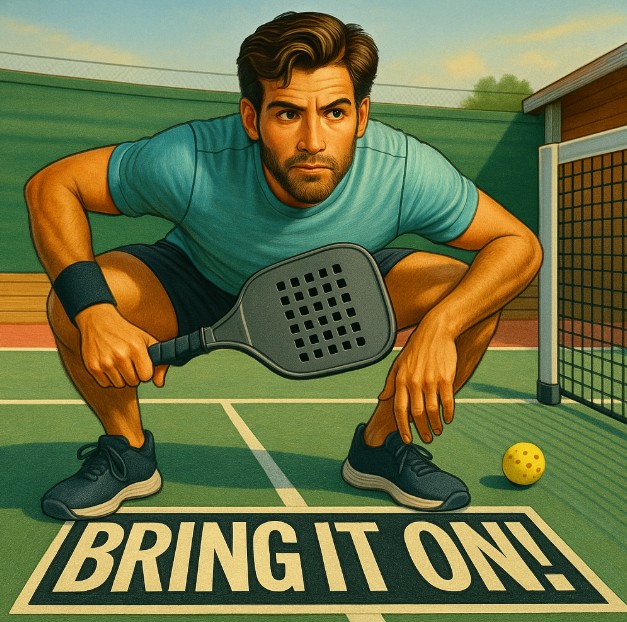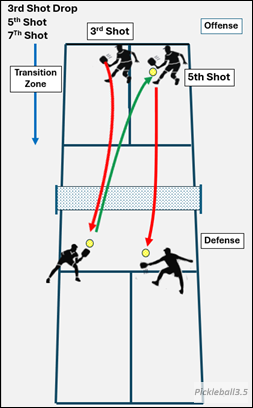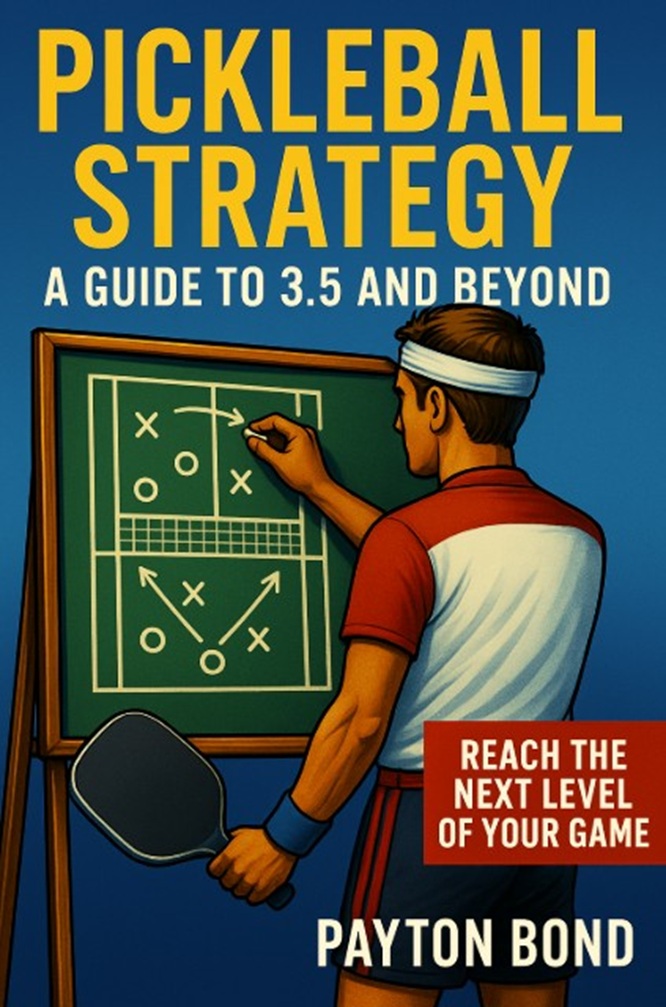
As reviewed in the previous post, you will need to use the third shot drop effectively and consistently to advance to the 3.5+ skill level in pickleball. The pickleball 5th shot drop is just another drop shot you hit after attempting a third shot drop.
If you found this page through a search, consider reviewing the previous post, which covers the fundamentals of the Third Shot Drop:
Pickleball Third Shot Drop – Your Best Third Shot Option
The 5th Shot Drop
In the illustration below a third shot drop is attempted. It is volleyed back by the defender and another drop shot; the 5th shot drop is attempted.

Navigating through the transition zone to the kitchen line is one of the great pickleball challenges. It’s not always a straight shot—sometimes it’s more of a zigzag journey that often requires multiple drop shots to get there.
The Art (and Struggle) of the Drop Shot
First things first: your drop shot needs enough power to clear the net. A shot too short ends the point immediately, and no one enjoys handing their opponents a gift-wrapped point. Knowing this, you’ll naturally focus on clearing the net—but in doing so, you’ll sometimes hit drop shots too deep.
Pickleball Wisdom: A short drop shot ends the rally; a deep one keeps it interesting (if slightly nerve-wracking).
Over time, your consistency will improve, but even seasoned players hit bad drop shots now and then. That’s okay—it’s all part of the journey to becoming an advanced player. The key is to keep practicing and, more importantly, to keep hitting drop shots. This is how you advance, even when it feels like a game of trial and error.
When a Drop Shot Goes Too Long
If your drop shot is too long, your opponent will likely seize the opportunity to volley or smash it back. When this happens:
- Move forward slightly: Don’t charge blindly; step in just enough to prepare for the next shot.
- Adopt a defensive stance: Keep your paddle ready, stay balanced, and prepare for a fast return.
The “Stretch and Volley” Scenario
Not all deep drop shots are a disaster. If your opponent has to stretch to volley it, they probably won’t have enough control to put the shot away. Instead, they’ll likely:
- Volley the ball back toward your feet to keep you back.
This is your cue to reset the rally with another drop shot—the famous “5th shot drop.”
Pro Tip: Don’t let one bad drop rattle you. Think of it as a warm-up for the next one—you’re just getting closer to that perfect drop.
The transition zone may be tricky, but persistence and smart positioning will help you master it. With practice, you’ll find your way to the kitchen line and start winning those hard-fought rallies.
Pickleball 7th Shot Drop – Don’t give up
If your next attempt comes back to you, execute a 7th shot drop and so on.
Keep hitting drop shots until you successfully land a drop shot in front of your opponent forcing them to hit a dink return or volley with an upward motion.
On each shot, if your opponent can’t put the shot away, you may take a step or two forward slowly making your way to the kitchen line.
You are slowly moving through the transition zone as you put pressure on your opponent with each drop shot.
Summary – Don’t Give Up
If your third shot drop isn’t perfect and is volleyed back, try another drop shot.
After hitting a good shot, move in towards the net quickly.
Failing to move in means you’re not ready to counter your opponent’s response. As you move in, if your opponent tries to volley a shot back at you and it is above net height, use your quick hands to put the shot away. Their response will likely be moving upward, and this is just what you are looking for to end the point.
Experienced opponents will recognize a good drop shot and know you are closing in and will just do a dink return. If they do this, you have succeeded and can now fight it out in a dinking rally.
Be assertive and advance on a successful drop shot to finish the play or get into a dink rally.
Check out Payton Bonds new eBook!
Pickleball Strategy – A Guide to 3.5 and Beyond
See it on Amazon.

👤 Follow Payton Bond
All Star and Top Contributor on multiple Facebook Pickleball Forums.
Contributor at TheKitchenPickle.com.
Visit Payton Bonds Facebook Page

